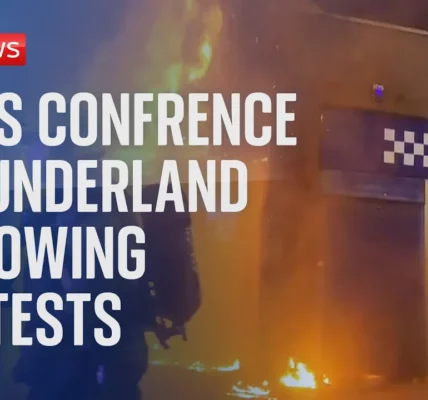Lebanon on the Brink: The Escalating Crisis of Israel’s Ground Incursion

This article delves into the ongoing conflict in Lebanon, examining the implications of Israel’s ground incursion, the humanitarian crisis it has engendered, and the broader geopolitical ramifications. With over a million displaced and heavy military operations underway, the situation demands urgent attention.
Introduction
The situation in Lebanon is rapidly deteriorating as Israel’s military operations intensify, leading to a humanitarian crisis of unprecedented proportions. Over 100,000 individuals are reported to have crossed into Syria, fleeing the violence that has gripped their homeland. This article aims to provide a comprehensive overview of the current conflict, the human cost involved, and the potential for escalation in the region.
The Current Military Situation
As news breaks of a limited ground incursion by Israeli forces into southern Lebanon, the implications are significant. Reports suggest that Israeli Special Forces are already conducting operations within Lebanese territory, focusing on key military targets associated with Hezbollah.
Heavy Artillery and Ground Operations
Visual reports indicate heavy artillery fire in border towns, with local media confirming the presence of Israeli tanks in locations such as Ramish. The Israeli Defense Forces (IDF) have declared several areas as closed military zones, raising concerns about the intensity and scope of the operations.
The Role of the United States
The United States has reportedly advised Israel to maintain a limited scope and geographical focus for its operations, reflecting concerns about escalating the conflict into a broader regional war. The dynamics of US-Israel relations play a critical role in shaping military strategies in the area.
Humanitarian Impact
The humanitarian crisis resulting from this conflict is severe. The Lebanese Health Minister has described the situation as catastrophic, with nearly a million people displaced in just over a week of conflict. The rapid exodus of families fleeing their homes speaks volumes about the urgency and desperation facing the population.
Displacement and Refugee Crisis
- Over 100,000 individuals have fled to Syria, seeking safety from the bombardment.
- Local shelters and facilities are overwhelmed, with many families forced to sleep outdoors or in makeshift accommodations.
- Reports of civilian casualties continue to rise, with entire families affected by airstrikes targeting military installations.
Conditions for Displaced Persons
Lebanon’s already strained resources are further stretched by the influx of displaced individuals. Schools and public buildings are being used as temporary shelters, but the lack of infrastructure and support raises concerns about the long-term viability of these solutions.
Geopolitical Ramifications
The conflict’s escalation comes with significant geopolitical implications, particularly in relation to Iran’s involvement and the broader regional balance of power. Hezbollah’s leadership has issued statements signaling their readiness for ground engagement, complicating the potential for a swift resolution.
Hezbollah’s Response and Military Posturing
Hezbollah, having suffered losses in leadership, maintains a robust military presence and is prepared to engage in prolonged conflict. This readiness poses a direct challenge to Israeli forces, raising the stakes for both sides.
Regional Stability and International Reactions
The situation has drawn international attention, with various countries calling for restraint and a focus on diplomatic solutions. The potential for further escalation into a wider regional conflict remains a pressing concern for global leaders.
Conclusion
The situation in Lebanon is critical, with Israel’s ground incursion posing significant risks to regional stability and humanitarian well-being. As military operations escalate, the international community must respond with urgency to address the humanitarian needs and seek paths to de-escalation. It is imperative for all parties involved to prioritize dialogue over military action to prevent further loss of life and suffering. For ongoing updates and developments, stay tuned to our coverage.
For further reading on related topics, visit our articles on Lebanon’s ongoing humanitarian crisis and the geopolitical implications of Middle Eastern conflicts.
“`




